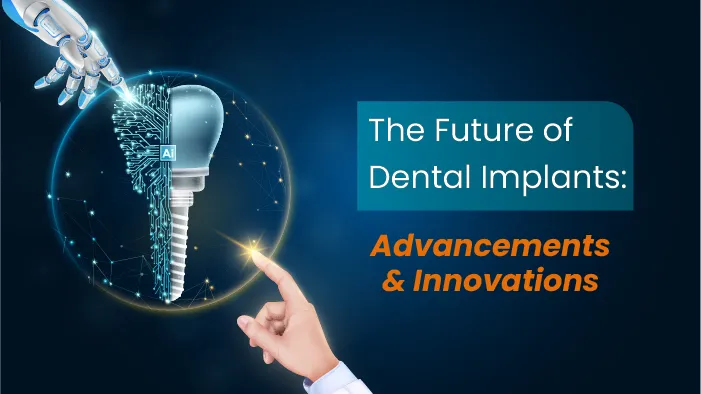The Future of Dental Implants: Advancements and Innovations
July 10, 2024
As the world transforms with innovation, artificial intelligence and inventions, the world of dental healthcare is also changing rapidly. Oral health solutions for corrective treatments as well as aesthetic improvements are already being developed. This includes breakthroughs in dental implants, which are increasingly used in dentistry to replace missing teeth, wide gaps and extractions.
Dental implants are now considered an optimum permanent solution for restoring missing teeth, while ensuring that the smile looks natural and appealing. The high success rate and the capacity to last a lifetime, make them a viable option for people.
Here are some innovations in dental implant procedures that are going to change the face of dentistry in the coming days:
Robot-assisted implants:
If that sounds like science fiction, it's not. Robots have been in use since 2017, in procedures like dental implant placement and other precise surgical interventions.
With robot-assisted implants and surgical procedures will soon acquire even more precision, be less invasive, faster and also be less painful. While the accuracy, experience and skill of orthodontists, periodontists and oral surgeons can vary, the 3 dimensional precision and efficiency will usually outweigh human exactness.
3-D printing for customised implants:
Dentists are now using 3-D printing technologies to their advantage. Scanning procedures, with the help of 3D printing, will soon allow exact replicas of the jaws and teeth, which will lead to accurate implants, crowns and prostheses.
With robotics entering the field of specialised dental procedures, more people will get treatments done faster. Simultaneously, costs will come down so that a larger population can have access to world class healthcare.
Nano-dentistry:
The use of nanotechnology in dental implants will optimise outcomes. Using a nanoscale, the finesse of modifying surface roughness will enhance the bone-to-implant contact, thus improving adhesion, bone formation, and antibacterial capabilities.
Organic implants through Stem-cells
Stem-cells have been a breakthrough in medicines for a while now, and the possibilities remaining are endless.
As per one of the available definitions - stem cells are primitive human cells, with the ability to grow into many different cell types with specialized functions; such as muscle cells, brain cells, and more. They are present in embryos as well as most body tissues (albeit less abundantly), teeth included, and have the ability to reproduce themselves.
Scientists are now considering the use of stem cells in growing back teeth naturally, instead of superficial replacements or painful implants. The research as well as the findings are still in its nascent stages as of now, but the potential this has is unlimited. It can be a boon for people who lose teeth due to aging, fractures, accidents or extractions.
Regenerative dentistry for tissue growth:
Dental researchers have developed bioactive materials that can help regenerate tissues around the implant site.
This will aid in natural healing of the implant, while strengthening the jawbone too, making it highly advantageous for those with compromised gum or oral health issues.
Minimally invasive, maximum benefits:
As newer technologies enter, one can be sure that they will be vastly more accurate, faster, and promote quicker healing and recovery. With less invasive, minimally painful and naturally restorative procedures, patients as well as dentists will heave a sigh of relief.
With time, one can expect these innovations to be easily accessible by all, thanks to the range of cost-effective dental treatments on their way.
The future is not some decades away, because the future has already entered our 'NOW'. The days of dreading your dentist's appointment will soon be behind you, so do remember to SMILE.















































